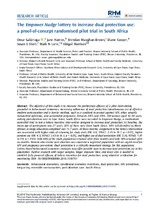| dc.contributor.author | Galárraga, Omar | |
| dc.contributor.author | Harries, Jane | |
| dc.contributor.author | Maughan-Brown, Brendan | |
| dc.contributor.author | Cooper, Diane | |
| dc.contributor.author | Short, Susan E. | |
| dc.contributor.author | Lurie, Mark N. | |
| dc.contributor.author | Harrison, Abigail | |
| dc.date.accessioned | 2018-11-19T07:42:34Z | |
| dc.date.available | 2018-11-19T07:42:34Z | |
| dc.date.issued | 2018 | |
| dc.identifier.citation | Galárraga, O. et al. (2018). The Empower-Nudge lottery to increase dual protection use: a proof-of-concept randomised pilot trial in South Africa. Reproductive Health Matters, 26(52): 1510701. | en_US |
| dc.identifier.issn | 0968-8080 | |
| dc.identifier.uri | http://dx.doi.org/10.1080/09688080.2018.1510701 | |
| dc.identifier.uri | http://hdl.handle.net/10566/4206 | |
| dc.description.abstract | The objective of this study is to measure the preliminary efficacy of a pilot intervention,
grounded in behavioural economics, increasing adherence of dual protection (simultaneous use of effective
modern contraception and a barrier method, such as a condom) to protect against HIV, other sexually
transmitted infections, and unintended pregnancy. Between 2015 and 2016, 100 women aged 18–40 years,
seeking post-abortion care in Cape Town, South Africa were recruited to Empower Nudge, a randomised
controlled trial to test a lottery incentive intervention designed to increase dual protection. At baseline, the
mean age of participants was 27 years; 82% of them were from South Africa; 58% self-identified as Black
African; average education completed was 11.7 years. At three months, assignment to the lottery intervention
was associated with higher odds of returning for study visits (OR: 6.0; 95%CI: 2.45 to 14.7, p < 0.01), higher
condom use (OR: 4.5; 95%CI: 1.43 to 14.1; p < 0.05), and higher use of dual protection (OR: 3.16; 95%CI: 1.01
to 9.9; p < 0.05). Only 60% of the study population returned after three months and only 38% returned after
six months. Women who receive post-abortion care represent a neglected population with an urgent need for
HIV and pregnancy prevention. Dual protection is a critically important strategy for this population.
Lottery-based behavioural economics strategies may offer possible ways to increase dual protection use in this
population. Further research with larger samples, longer exposure time, and more sites is needed to
establish fully powered efficacy of lottery incentives for dual protection; using objective verification for
monitoring. | en_US |
| dc.language.iso | en | en_US |
| dc.publisher | Informa UK Limited, trading as Taylor & Francis Group | en_US |
| dc.rights | This is an Open Access article distributed under the terms of the Creative Commons Attribution-NonCommercial License (http://
creativecommons.org/licenses/by-nc/4.0/), which permits unrestricted non-commercial use, distribution, and reproduction in any
medium, provided the original work is properly cited. | |
| dc.subject | Behavioural economics | en_US |
| dc.subject | Conditional economic incentives | en_US |
| dc.subject | Dual protection | en_US |
| dc.subject | HIV prevention | en_US |
| dc.subject | Long-acting reversible contraceptives | en_US |
| dc.subject | Post-abortion care | en_US |
| dc.subject | South Africa | en_US |
| dc.title | The Empower Nudge lottery to increase dual protection use: a proof-of-concept randomised pilot trial in South Africa | en_US |
| dc.type | Article | en_US |
| dc.privacy.showsubmitter | FALSE | |
| dc.status.ispeerreviewed | TRUE | |

